
Can CBD Cause You To Fail A Drug Test?
Regular random drug testing is an unfortunate reality for many people. Luckily, taking CBD supplements like oils, tinctures, creams, or edibles shouldn't affect your drug test results. Keep reading to learn why.
Whether you’re taking it to promote sleep readiness or to soothe your muscles following a workout, the last thing you want is your CBD oil to trigger a positive result on your upcoming drug test. Luckily, the chances of that happening are very slim.
Keep reading for an in-depth look at CBD, how it works, and why it likely won’t have any effect on your drug screening results.
Can CBD Ruin a Drug Test?
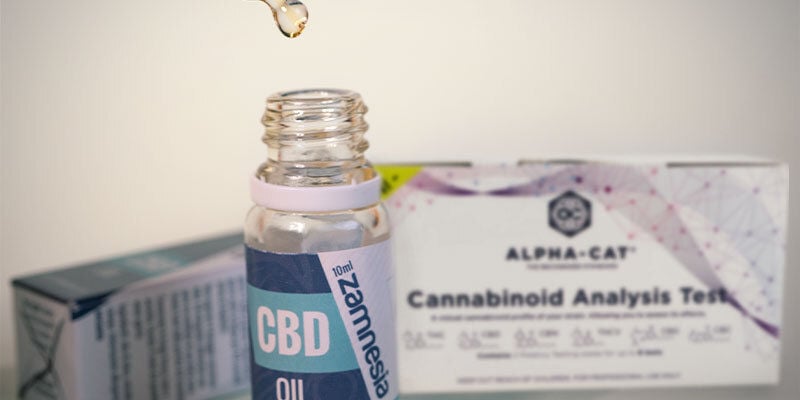
The assumption that taking CBD might cause you to fail a drug test is pretty warranted, seeing that it is derived from Cannabis sativa. The answer to this seemingly simple question, however, is complicated.
The general consensus is that CBD supplements shouldn’t affect your drug test results, but they could in certain circumstances. To better understand this, we need to go into a bit more detail about how both drug tests and CBD work.
How Does Workplace Drug Testing Work?
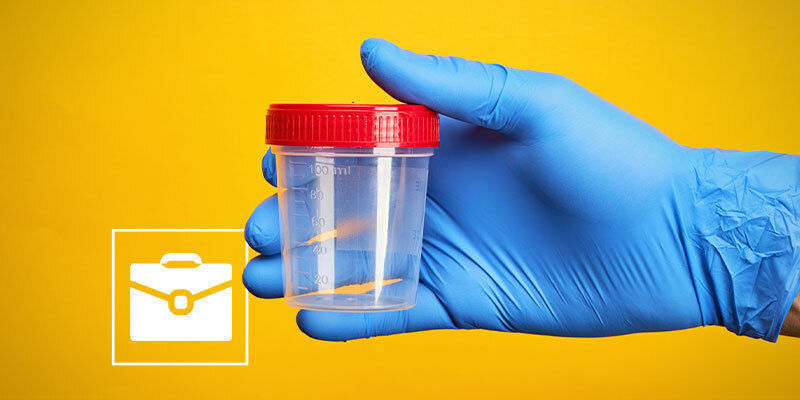
The drug tests used by employers or sports authorities fall into two main categories: screening tests and confirmation tests. While they are very different, both screening and confirmation tests test for drug metabolites.
Screening tests work by using antibodies to test for drug metabolites in a saliva, urine, or hair sample.
First, the testers apply antibodies to the receptacle they’re using to conduct the test. Once the sample goes in, the antibodies will begin latching onto the drug metabolites being tested. The testers then remove the sample and add a secondary batch of antibodies into the receptacle. These antibodies contain a colour-changing enzyme that later reacts to this enzyme, producing a colour that indicates which metabolites are present in the sample (if any).
Confirmation drug tests are much more complex and expensive. They use either gas chromatography or mass spectrometry to respectively separate or break apart the molecules present in a sample, making it easier for the testers to identify any drug metabolites present.
If you’re reading this, chances are you’re most familiar with drug tests of the following kind, seeing as they’re the go-to drug tests used by employers.
Saliva and Urine Drug Testing
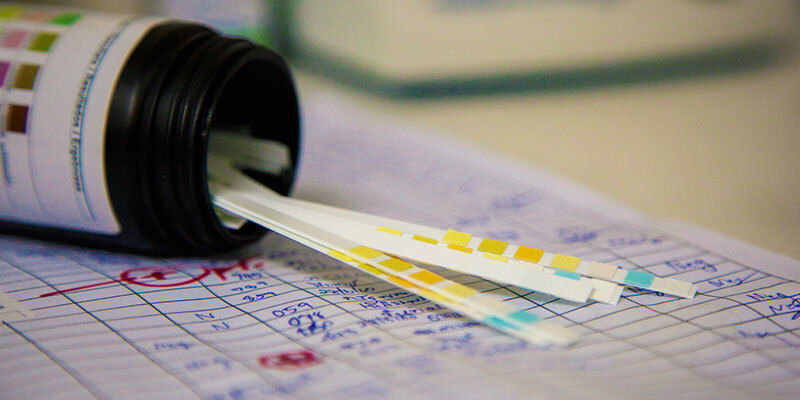
Saliva and urine immunoassays are the most common types of drug tests used in the workplace.
Urine tests typically test for drugs used within the last 7–10 days, but some drug metabolites (like those of THC and other cannabinoids) can be detectable in urine for up to 30 days in moderate users, and up to 90 days in heavy users.
Saliva tests detect drugs used within a much shorter time frame, ranging from 12–24 hours for alcohol, cannabinoids, and amphetamines to 7–10 days for some prescription drugs and cocaine.
Hair and Blood Drug Testing
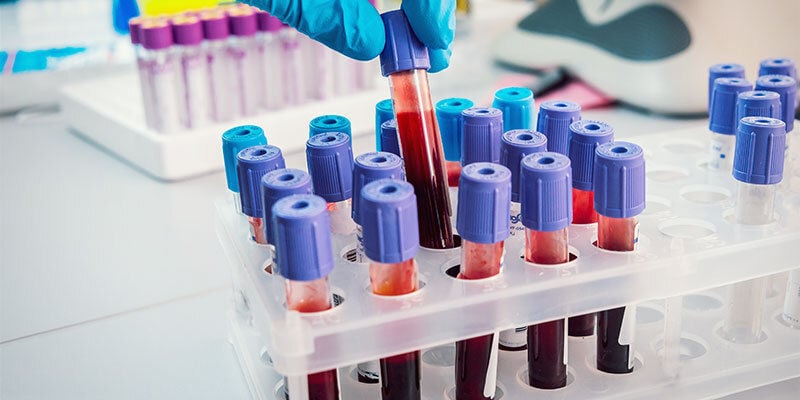
Hair and blood drug tests are far less common in workplaces, mainly because they are much more expensive to conduct. Blood tests are also much more invasive than urine, hair, or saliva tests.
Nonetheless, blood and hair drug screenings are much more accurate, and can test for drugs used over a longer period of time. Hair screening tests, in particular, can detect metabolites up to 90 days back.
Is There a Drug Test for CBD?
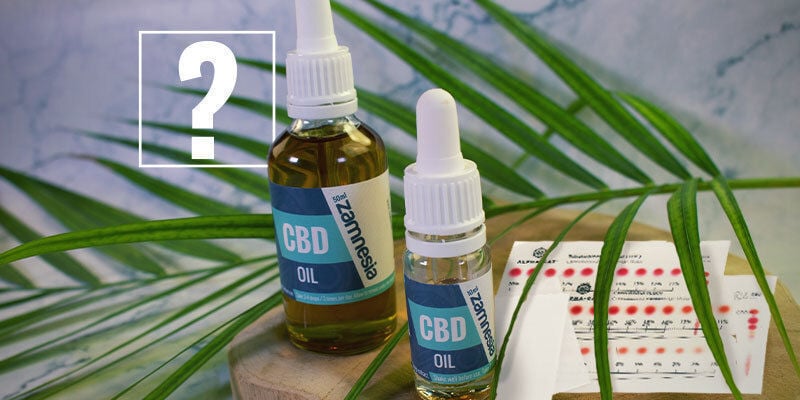
There is no drug test that looks to identify CBD. All of the drug tests mentioned above test for THC metabolites only (when it comes to the cannabis plant). If you’re reading this, you probably know that THC is the main intoxicating compound found in marijuana. That being the case, most countries' drug laws are only concerned with THC, and don’t consider CBD a controlled or illicit substance.
What’s a 5-Panel Drug Test?
Five-panel drug tests are the most common drug tests used in the workplace. These tests use iconic paper strips with five different-coloured panels to test for metabolites of the following common recreational drugs:
- Cannabis
- Cocaine
- Amphetamines
- Opiates
- PCP (Phencyclidine)
Sometimes, workplaces or sports authorities might run extended versions of this test, which also test for metabolites of ethanol, hallucinogens, barbiturates, benzodiazepines, anabolic steroids, and inhalants.
Will Taking Full-Spectrum CBD Oil Cause Me To Fail a Drug Test?
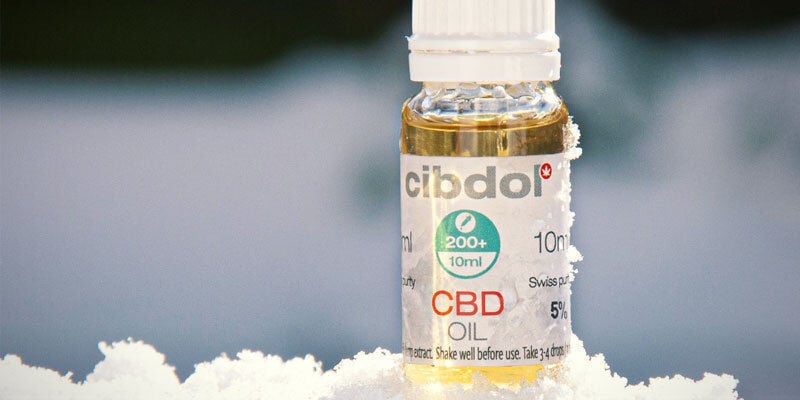
Full-spectrum CBD products contain all of the active compounds found in cannabis and hemp, including trace amounts of THC, which, at least in theory, might be able to set off a drug test.
Remember, the legal level of THC allowed in hemp-derived CBD products tends to be between 0.1 and 0.3% depending on the country. Therefore, any quality full-spectrum CBD oil manufactured to these standards shouldn’t contain nearly enough THC to trigger a positive test reading.
What Is a False Positive Drug Test Result?
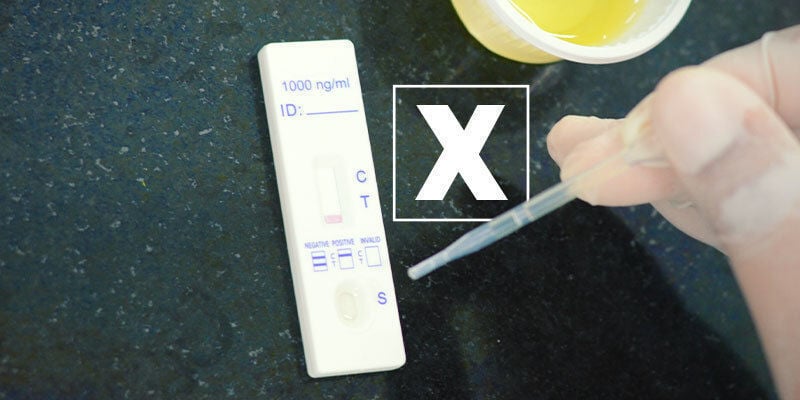
A false positive drug test result, you guessed it, is when you test positive for taking a drug that you never took. While it is rare, some CBD users may test false positive for THC.
This can happen to those taking very high daily doses of CBD oil over long periods of time, or those taking CBD products that contain more than the legal limit of THC.
In rare cases, the trace amounts of THC present in full-spectrum CBD oil might be enough to produce a positive reading on very precise tests using blood or hair samples. In general, however, the amount of THC in hemp-derived CBD products shouldn’t be enough to warrant any worry.
Can CBD Convert Into THC in the Human Body?
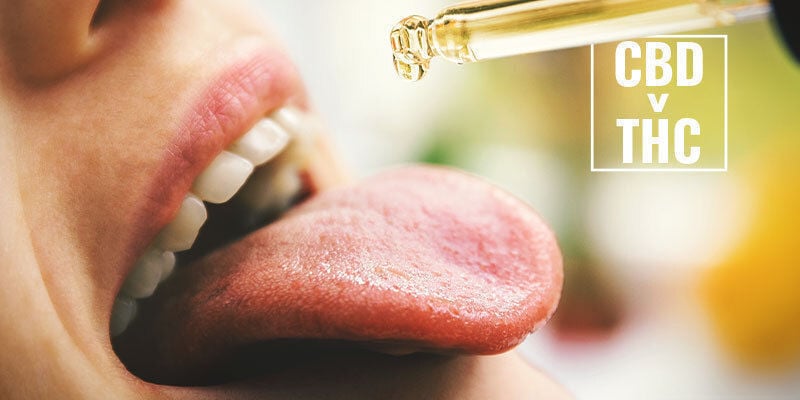
There are a few rumours floating around the internet suggesting that CBD can convert into THC inside the body. These likely started in response to two in vitro studies; the first showed that, when mixed with simulated gastric fluid that lacked pepsin (the chief digestive enzyme present in the human stomach), CBD converted into THC at a rate of almost 3%.
The second study was similar; researchers mixed CBD with gastric fluid (without enzymes) in a test tube for 3 hours. They then examined the sample using gas chromatography and mass spectrometry and found that, while close to 98% of the CBD had degraded, what was left was mainly THC.
While these studies might seem conclusive, they really aren’t. Multiple in vivo studies have tried to replicate these results and failed.
One study, conducted by GW Pharmaceuticals, administered CBD to mini pigs at a dose of 15mg/kg of body weight per day (which is an extremely high dose for these animals; most humans take between 10 and 20mg of CBD per day).
The researchers used mini pigs in this trial because their GI tract is very similar to that of humans. In fact, many other animal-based studies looking at the GI tract use mini pigs for this same reason.
After five days, the researchers analysed blood plasma samples from the animals, which were free of any traces of THC. Where the earlier in vitro studies fell short was in their testing of CBD outside of the digestive tract, using simulated gastric fluids that weren’t actually very similar to the digestive fluids found in the human body.
How To Make Sure CBD Won’t Affect Your Drug Test Results
Still worried about failing an upcoming drug test at work? Don’t be. Follow these simple tips for extra peace of mind.
Only Buy Quality CBD Products
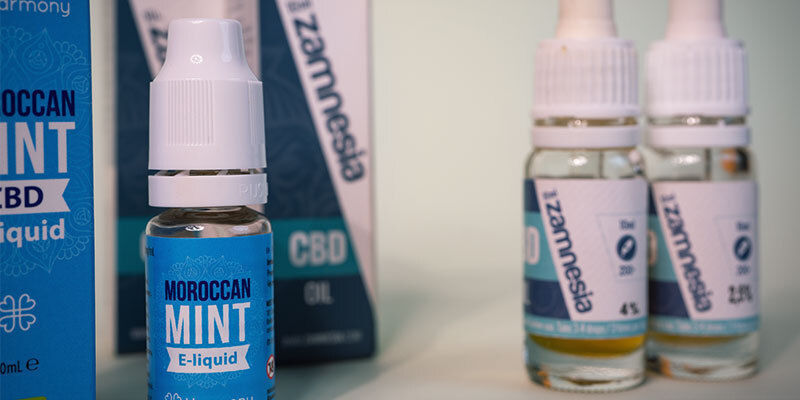
If you want true peace of mind, always make sure to buy CBD products from a reputable manufacturer that provides third-party test results for all of its products. Never buy CBD oil on the street or from another illegal or unregulated source.
As you would with other supplements, it pays to splash out a bit more cash on CBD products that have been fastidiously produced and independently verified. You don’t need to choose the most expensive or trendy brand available, but this is not the time to be at your most frugal.
Always Check the Label on Your CBD Oil
Remember to carefully read the label of any new CBD product you plan on buying, and make sure its THC content is on par with what’s legal in your country. In Europe, the legal limit tends to be 0.2% THC, while in America the limit is 0.3%. These are considered trace amounts that will not impact functioning or produce any psychotropic effects.
Look for THC-Free Hemp-Derived CBD Products
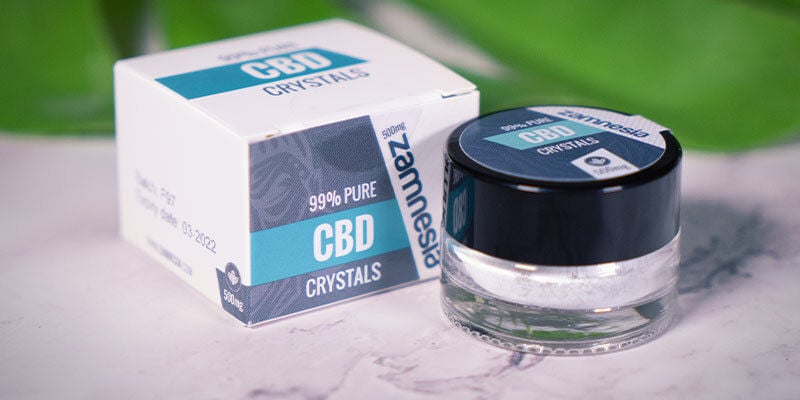
If you want to be really safe, you can go completely THC-free. Unlike full-spectrum CBD products, broad-spectrum CBD oil and CBD isolate contain no THC whatsoever, and are great for people who undergo regular drug testing at work.
The good thing about broad-spectrum CBD oil is that it contains all of the other cannabinoids and terpenes in hemp, save for THC. This means you can still benefit from the diverse chemical profile of Cannabis sativa, with total peace of mind.
CBD isolate, otherwise known as CBD crystals or pure CBD, is just that—CBD and nothing else. Isolates measure up to 99% CBD (with trace amounts of terpenes) and can be made into CBD oils and topicals for easy and secure administration.
Avoid Secondhand Exposure to THC
If you’ve got a drug test coming up, avoid social gatherings where your friends and family consume cannabis. Sitting in a room with heavy pot smokers for hours may expose you to enough THC to produce a positive drug test result.
Will CBD Make You Fail a Drug Test? — Final Tips To Put Your Mind at Ease
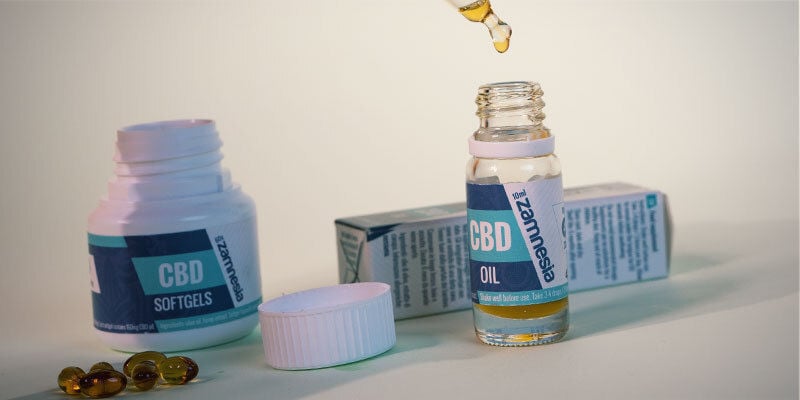
We can’t stress this enough; if you’re buying CBD, make sure you only source products made by legitimate companies in countries with strict quality control standards. As we saw in this post, the chances of CBD oil jeopardising your passing of a drug test are virtually none, but only if the CBD you’re taking is of a good quality and abides by your local laws.
Once you find a retailer with independently tested, high-quality CBD products, you should have no trouble if it comes time for you to take a drug test.
- (n.d.). (PDF) Conversion of cannabidiol to Δ9-tetrahydrocannabinol and related cannabinoids in artificial gastric juice, and their pharmacological effects in mice - https://www.researchgate.net
- John Merrick, Brian Lane, Terri Sebree, Tony Yaksh, Carol O'Neill, & Stan L. Banks. (2016). Identification of Psychoactive Degradants of Cannabidiol in Simulated Gastric and Physiological Fluid - https://www.ncbi.nlm.nih.gov
- Louise Wray, Colin Stott, Nicholas Jones, & Stephen Wright. (2017). Cannabidiol Does Not Convert to Δ9-Tetrahydrocannabinol in an In Vivo Animal Model - https://www.ncbi.nlm.nih.gov
-
 5 min
25 November 2025
Popular tricks vs reality: Can you really cheat a urine drug...
The internet is full of urine drug test myths, from wild TikTok hacks to whispered “guaranteed” tricks shared on forums. You'll hear that drinking water helps pass a drug test, or that vinegar can...
5 min
25 November 2025
Popular tricks vs reality: Can you really cheat a urine drug...
The internet is full of urine drug test myths, from wild TikTok hacks to whispered “guaranteed” tricks shared on forums. You'll hear that drinking water helps pass a drug test, or that vinegar can...
-
 3 min
18 March 2025
Does kratom show up on a drugs test?
More and more people are taking kratom, which means it's becoming more of a concern whether or not it shows up on drug tests. Generally, it won't. But it could! Find out more below.
3 min
18 March 2025
Does kratom show up on a drugs test?
More and more people are taking kratom, which means it's becoming more of a concern whether or not it shows up on drug tests. Generally, it won't. But it could! Find out more below.
-
 7 min
4 January 2022
Drug Tests: What You Need To Know
Drug tests range from a nuisance to potentially life-changing. If you're using drugs, and people really want to know, there are ways to find out. However, learning about the process can help you...
7 min
4 January 2022
Drug Tests: What You Need To Know
Drug tests range from a nuisance to potentially life-changing. If you're using drugs, and people really want to know, there are ways to find out. However, learning about the process can help you...
-
 4 min
8 August 2021
Top 5 Zamnesia CBD Products
Shopping for CBD can be a confusing experience. There are so many products and brands out there. At Zamnesia, we provide a high-quality CBD line featuring numerous easy-to-use products.
4 min
8 August 2021
Top 5 Zamnesia CBD Products
Shopping for CBD can be a confusing experience. There are so many products and brands out there. At Zamnesia, we provide a high-quality CBD line featuring numerous easy-to-use products.





 United States
United States











